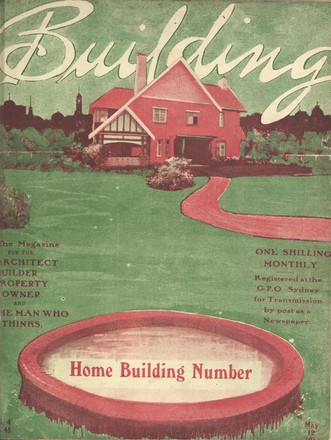Building: the magazine for the architect, builder, property owner and merchant, 1907-1942
Printed periodical
690.5/2; 720/B; T0405570
Billed as the ‘magazine for the man (&
woman) who thinks’, within 12 months of its launch in 1907, Building was proclaimed as ‘the high
watermark of Australian Magazines’. Priced at a shilling, Building promoted urban planning ideas and kept readers informed
about local and international construction methods.
With digitisation of Building magazine completed, there are 73,000 pages available via
Trove.
Florence Taylor shared her husband’s recreational interests
and hobbies, which included aviation and gliding. On 5 December 1909, she
become the first woman to fly a heavier-than-air machine in Australia, when she
took flight from the Narrabeen sand hills, near Sydney, in a guilder built by
her husband.
In 1914 the Taylors were active in the establishment of the
Town Planning Association in Sydney. Throughout her life, Florence would
produce visionary town planning schemes for Sydney's future development,
largely based on improving traffic flow by re-routing roadways and increasing
public transport.
Florence Mary Taylor, nee Parsons, 1879-1969, was born in
Bristol, England and arrived in Australia in 1888. Her career as Australia's
first professional woman architect and structural and civil engineer commenced
in 1899.
Florence Taylor's proudest epithet - as the most remarkable
woman in the empire - was provided by the industrialist Essington Lewis
(1881-1961), wartime director of munitions and managing director of BHP. Her
enduring legacy lies in her contribution, made for over fifty years, as a major
publisher, writer and editor in the fields of architecture, construction and
town planning.
Attending night classes at Sydney Technical College,
Florence Parsons became the first woman to complete final fourth year studies
in the architecture school. She gained her engineering qualifications at
Stowe's private Marine Engineering College in Sydney.
A review of the First Australian Exhibition of Women’s Work
in 1907 noted architectural designs by Florence Taylor (Sydney); at this time
she was one of only three in women the architecture profession in Australia,
the others being Mabel Dunstan (Melbourne) and Lily Addison (Brisbane).
In 1907 Florence attempted to join the New South Wales
Institute of Architects but claimed that she was rejected because she was a
woman. This episode heralded the end of her career as a practising architect.
Thirteen years after she had first been nominated and refused, Taylor was
finally accepted by the NSW Institute of Architects in 1920,



 Back to list
Back to list